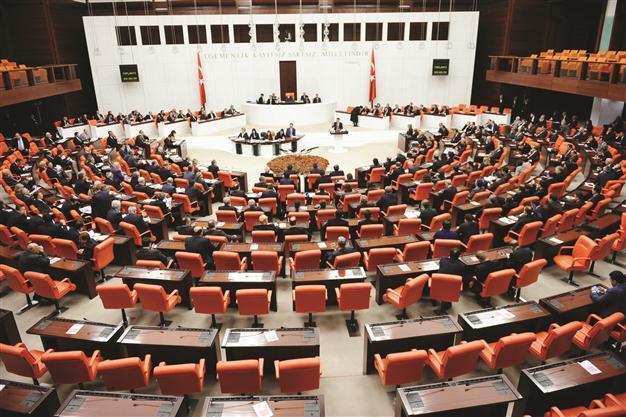Turkish government mulls new charter pact with BDP
ANKARA - Hürriyet Daily News

DAILY NEWS photo/Selahattin Sönmez
The ruling Justice and Development Party’s (AKP) deputy chair and Constitution Conciliation Commission member Mustafa Şentop listed the three options ahead them in the process of forming the new charter, including options in alliance with the Peace and Democracy Party (BDP) only.According to Şentop, if a consensus is not reached in the commission, the AKP would submit its own proposal to Parliament and search for ways to form the new Constitution with a new partner in Parliament. This partner would possibly be the BDP, but the AKP will also propose cooperation to the Republican People’s Party (CHP), as well. In order for the new Constitution to pass through Parliament, 330 seats must vote affirmatively.
Şentop said the second option was waiting until the 2015 general elections for the new constitutional proposal. The third option, however, depicts the most contradictory formula of the AKP. If there is public pressure for the new Constitution, a new article will be added to the current Constitution for the acceptance of the new Constitution with 330 seats. This article will be put to a referendum. “I find the applicability of this option quite low since local elections, presidential elections and general elections will follow each other. I think no time will remain for that in the middle of such [a busy] schedule,” Şentop said.
Fihgting pro-coup mindset
“We want to omit the pro-coup and pro-ward mindset from the Constitution. What I really mean with [the pro-ward mindset] is the authority to use political power only through the Constitution without needing elections, which is the main aspect of a pro-ward Constitution. The nation exercises its sovereignty through the organs stated in the Constitution. We want to omit the rule of power that draws its strength from the Constitution. But we cannot shift into a model that justifies the ward of bureaucracy and political parties. Sovereignty will be based on the nation and elections,” Şentop said.
“Secondly, we do not favor an ideological Constitution. The Constitution can have an ideology, but it cannot adopt any ideology. We want the Constitution to become a fundamental text that will regulate the state institutions,” Şentop said.
“Thirdly, the new Constitution should be based on democratic legitimacy in the exercise of sovereignty.
It will also be based on liberties and freedoms. It will not condescendingly present the fundamental rights and liberties. We are against the view of limiting the fundamental rights and liberties to those written in the Constitution. Liberties are exercised even though [they are] not stated in the new Constitution,” Şentop said.
















